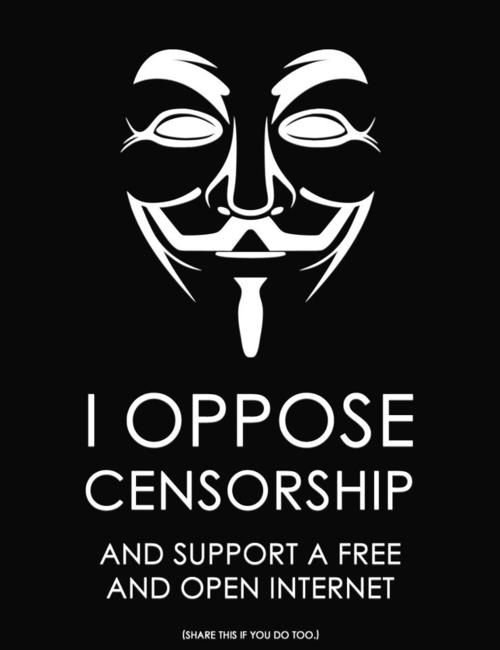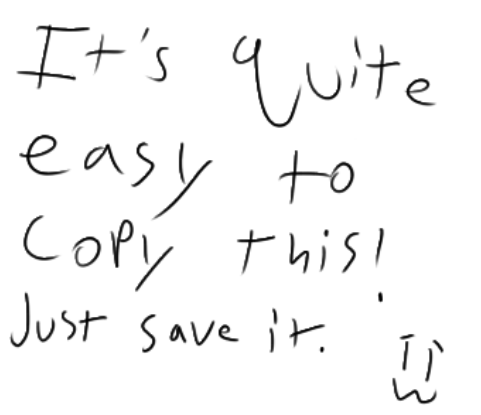All information at your hands is yours. You can use it how you like. But they will try to stop you.
Information should be spread freely, and without limits.

I am anti-censorship, and therefore, I cannot approve of any form of copyright or licensing of data.
The only reason I would ever withhold information is because of my own desire for privacy, or because someone, such as a government or other powerful entity, is threatening or blackmailing me.
Otherwise, once information has been released, be it in image, video or verbal form, it is released, and no law of nature or physics can contain it.
A government can attempt to create shallow, desperate laws and try to deliver some sort of punishment, but the idea that information cannot be reused after it's released is completely subjective, and has no basis in any sort of objective ethics or morality.
Access to any and all information, and the ability to share any and all information is the right of all humans.

This text can be copied too, and there's nothing I, or anyone, can do about it.
Unless I call on a big meanie government to f^@& you up.
The fact of this reality is that information can be reused as much as you want. Information is an interesting concept because it can be copied limitless times for no or very little resource cost. This means that anyone who isn't being forcefully restricted from copying information is able to duplicate data extremely easily.
Attempting to fight this is futile. Governments will threaten to steal our money or jail us if we commit what they call "copyright infringement", but the reality is that information is extremely friendly towards duplication.

Copyright is censorship. Censorship is bad.
Be it genetic codes, computer data, or genius ideas, all information is very compatible with duplication and modification. Trying to suppress this fact of nature will only hamper and slow down development of newer, better ideas. Patents, copyrights, and censoring unapproved ideas or information eliminates freedom and ends up punishing people who don't deserve anything but praise.
Although some people say that copyright doesn't have a black or white solution, because of how useful copyright can be to legitimate artists, I disagree. There is a black or white solution, and that solution is Steemit, or at least a modified version of Steemit.

The solution to copyright is Steemit. Allow information to be freely distributed, but also allow the creators to be credited and paid.
Being able to upvote content such as music, video games, movies, art, etc, can give people money, huge amounts, on the orders of ten thousand dollars or more, without any actual need to pay anything.
Although Steemit is still small, if it was given official media attention, and the government invested the same amount of money into it as it does enforcing copyright law, we could see the value of Steemit or a Steemit-like system go way up.
This would solve the problem, allowing content creators to make money, while still distributing their work for free.
My personal recommendation is to be careful with what you copy, because some thugs might want to hurt you if you copy it. But at the same time, understand that the nature of reality itself is very happy when you copy information. You share ideas better, provide useful content or code to more people, and generally allow all information to freely flow, avoiding that dark, oppressive hand of censorship.
Censorship is one of the greatest threats our computer-age society faces.
Lose the ability to freely share ideas, and we might as well not even use this internet.
Copyright is censorship. There should be only encouragement to share, copy, and make ideas better.
~Kitten
Should you ever create something of REAL value you will appreciate a Copyright.
Not all people share your values.
Give me free stuff I deserve it attitude gets you nowhere. I guess you are a SJW?
Petty insults will not win you respect in the long-term.
You'll end up making enemies of potential allies, and disgracing yourself by rejecting those who could be friends.
If you are a commie there won't be commonalities between us anyways. But I forgive you should you still be young.
It's so true, there really is nothing anyone can do to stop the spread of information, art, anything that is put out there...but to hold it in one's own mind or perhaps a secret journal :)
I have a theory about that as well, I think ideas are an energy we don't quite understand. When I have an idea, I think others do too, anyone who's "tuned in" to the same sort of energetic frequency by their experience and general focus as a waking human.
But art I believe is different. It's something that is personal and comes from oneself alone. It's not like having an idea to start a particular business, or a clever invention. And so, how is the artist able to say, this was mine, this came from my experience, if others simply take it and call it their own experience?
I agree that copyright is not a great solution for the artist. It doesn't really do much unless, as you said, I want to get the government to ruin the person who defrauded me's life.
But that's also different than crediting. If someone say's "this poem is from this barefoot guy, here it is" I'm actually okay with that. I don't need to grant permission. But I do have a problem with someone saying "this is mine, I experienced this and then wrote it" which essentially happens when someone doesn't credit.
As for paying me to use or share my work, that's besides the point and a different problem I have to solve...how to feed my family.
But if someone took your identity, your face, your scars, your experiences, your lovers, your children...called all of that there's and essentially fronted themselves as being you, that's not okay either. Copyright doesn't solve that problem...but it sort of lets people know "I'm not okay with that"...or at least that's how I presently see it.
I'm open to exploring this subject more though. I want to expand my thinking and find out how to better solve the question of how to maintain an artists intimate identity with their creations while sharing it freely. And perhaps all that's needed is credit. The reason not giving credit is not okay in my opinion is it not only robs the artist of their voice, but robs the world of hearing and knowing the true artist behind that art. So it boils down to authenticity and relationships.
I'm rambling...but sort of trying to think out loud on the subject. Thanks for the article. Really thought provoking.
Namaste
Luckily for us, a person can only steal art for so long.
At some point, they'll be found out, and then shamed. Endless shame.
I think most people, no matter the laws, severely look down on art-thieves who claim that content they're selling is theirs. But that's still different than selling bootleg copies of stuff out of a back of a van.
I'm not really sure how to deal with that.
Nice, really clear cut.
My poetic mind tends to be a very densely populated forest of old growth and open caves to get lost in. I like when someone can really just be crisp in their laying something out.
And I believe you're right, perhaps it's hard to see that long-term thing when you're in the moment. Thus copyright only serves the artist in making them feel safe, when really it's not helping anything but making them seem like everyone else.
And honestly, if someone was selling my work, crediting me, in bootleg form...at this point in my life I wouldn't mind...I'd appreciate them getting my name out there! Because honestly, the most important thing to me, is that I'm read and my words can mean something to more people. I mean that too, not trying to be all superior or something.
Maybe if I was relying on my poetry to pay the bills and bootleg sales were actually making me suffer, it would be different. Or if a musician took my words, put them to song, and it was a huge hit and I never saw the credit or any kickback...that would sting because I actually need money to take care of my daughter and am in a serious need situation.
I think Steemit CAN be a partial solution. The issue is visibility here, for one thing. I'm used to posting a poem on instagram and having several likes within the first minute. If it takes longer than 1 minute to get my first like, I begin panicking and consider removing the post! LOL And I usually want between 200 and 300 likes to know I did good.
Here, I'm finding 15 votes is amazing...and especially when the potential to get paid is involved, it becomes a thing...okay off track...but again, thank you for this article and discussion...
you may have a convert to your reckless ways...but I research things a lot first..so we need to keep the conversation going.
Exactly and it is very much a matter of courtesy and good behaviour. I don't think real people (not talking about corporations) would sue anyone who acted in good faith or made a mistake.
Dont forget patent laws. Between the two, copyright and patent, humanity is in handcuffs... pay up or else nothing happens and nobody can know.
I agree with some of what you are saying. Part of this is down to how our society is set up. Everything must be monetised.
I think a lot of people (myself included) would be happy to get more people to see our work through other people making use of it and highlighting it.
I think if people using other people's material at least asked first they might be surprised how many people would be happy for their work to be used by others.
That's why a lot of us put out material under creative commons.
I also see the other side too.
It is not cheap in terms of time or money to produce most kinds of art and any money that people make off it helps to fund the next project.
I also think we can all agree that trying to take credit from or monetise other people's work (a step beyond just using it) is at least in some ways morally wrong.
Both sides of the argument have merit. There is no simple black or white solution.
You're simply wrong. =3
There is a black or white solution, and that solution is Steemit, or at least a modified version of Steemit.
Being able to upvote content such as music, video games, movies, art, etc, can give people money, huge amounts, on the orders of ten thousand dollars or more, without any actual need to pay anything.
Although Steemit is still small, if it was given official media attention and the government invested the same amount of money into it as it does enforcing copyright law, we could see the value of Steemit or a Steemit-like system go way up.
This would solve the problem, allowing content creators to make money, while still distributing their work for free.
I'm adding this to my post, seeing as I think it's wise. Thanks for inspiring me.
I hadn't thought about that but I doubt things will change. We will see.
This is a misunderstanding. It may seem like you are not paying but the community is paying for it collectively.
This is true, but even so, a person without any money can still read the content here and benefit. There's no restrictions regarding who can and can't access content.
Income-class restrictions currently prevent some people from accessing certain information.
Scientific journals, for example, are often hidden behind a paywall.
The poor cannot access up-to-date science information because they need to pay for it.
This is quite a tragedy in the name of profit! What if they have a really good invention idea, but can't access specific information regarding some necessary components? No invention.
Same with movies, books or video games. People without money can't gain access.
However, they often demand access by simply pirating it.
Steemit can eliminate this, while still allowing profits to flow towards the source of information or content.
But the real issue isn't content being free in price.
It's that it's free in the sense of freedom.
I agree with you, information has to will extend is free if it for the people
@heretickitten I'm interested to know what your usual occupation is. Something tells me you don't need to feed a family from your own intellectual property, but I could be wrong.
While I'm here, I'd like to address some of your points.
- Nobody is restricted from sharing their own ideas. If you have an idea, you can share it freely. Don't you think other peoples ideas have value? What about artistic creations, discoveries and inventions?You use the words idea and information interchangeably, yet they are very different things.
Sure, they're both concerned with regulating what people say, but for utterly different reasons. Censorship is about thoughts and ideas being ideologically evil or "offensive". Copyright is about thoughts and ideas having value. In some ways, they are completely opposite.
I believe we have a reasonable paradigm now, where creatives and inventors are free to share their own ideas and creations through creative commons, and they can also choose to protect their intellectual property. The open-source world has taken off and been a great aspect of technology. As a consumer, you have the choice to pay for stuff legally, take free stuff that is given out free, or steal stuff that is protected by copyright.
As a musician, graphic designer and photographer, in my opinion, your insistence that peoples hard work should be released and shared for free by default, is utterly contemptible. I give a lot of work out for free, but it is my prerogative if I want to charge for it, and it is utterly unfair that someone on the other side of the world can sell my work, and claim it as their own.
I've always used the arts as a way to express myself, but I've heard that trying to make money off of it is quite a challenge.
That's why I don't try to make money off of intangible products like ideas or information; instead, I build things with my knowledge. I'm an engineer.
Scientific information is for anyone and everyone, and that information can be taught by teachers, read in books, repeated infinitely, but engineered products are real. Same with any information. All ideas should be copied and used. Ideas and concepts within the creative world of the arts should be respected, but that doesn't mean that they can't be duplicated.
It's the difference between a painting and a .jpg file of a painting.
It's the difference between downloading an album, and seeing a band play live.
One is a real product or event that cannot be copied, and one is a bundle of data, which can be copied without effort.
Same with your art and ideas. Once you've written something down on the internet, you've put it into a medium where it can be duplicated infinitely for free. People will do so, and there is little you can do to stop them, unless you want to forcefully censor people using the government or something. I disapprove of that sort of thing though, and I'm not going to recall my anti-government stance just because it'd favor my wallet.
Not only that, but it's not so much what's right or wrong, but rather, the reality of the situation.
If it can be copied, it will be copied. That's just how it is.
How you deal with that is up to you, but I'm one to say: If you want to make a living, do what is profitable. Not what's fun. Arts 'n crafts is a fun hobby in school, but this world is cruel. Deliver something useful or un-reproducible, or you'll starve.